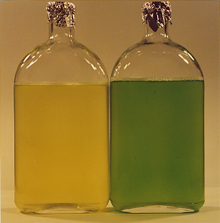 Hydrogen from algaeGenetically modified algae could be efficient producers of hydrogen and biofuels. Sep 27, 2007 - Prachi Patel - Technology Review Algae are a promising source of biofuels: besides being easy to grow and handle, some varieties are rich in oil similar to that produced by soybeans. Algae also produce another fuel: hydrogen. They make a small amount of hydrogen naturally during photosynthesis, but Anastasios Melis, a plant- and microbial-biology professor at the University of California, Berkeley, believes that genetically engineered versions of the tiny green organisms have a good shot at being a viable source for hydrogen. The new finding will be important in maximizing the production of hydrogen in large-scale, commercial bioreactors. In a laboratory, Melis says, "[we make] low-density cultures and have thin bottles so that light penetrates from all sides." Because of this, the cells use all the light falling on them. But in a commercial bioreactor, where dense algae cultures would be spread out in open ponds under the sun, the top layers of algae absorb all the sunlight but can only use a fraction of it.
Melis and his colleagues are designing algae that have less chlorophyll so that they absorb less sunlight. That means more light penetrates into the deeper algae layers, and eventually, more cells use the sunlight to make hydrogen. The researchers manipulate the genes that control the amount of chlorophyll in the algae's chloroplasts, the cellular organs that are the centers for photosynthesis. Each chloroplast naturally has 600 chlorophyll molecules. So far, the researchers have reduced this number by half. They plan to reduce the size further, to 130 chlorophyll molecules. At that point, dense cultures of algae in big bioreactors would make three times as much hydrogen as they make now, Melis says. The process is still at least five years from being used for hydrogen generation. Researchers will first have to increase the algae's capacity to produce hydrogen. During normal photosynthesis, algae focus on using the sun's energy to convert carbon dioxide and water into glucose, releasing oxygen in the process. Only about 3 to 5 percent of photosynthesis leads to hydrogen. Melis estimates that, if the entire capacity of the photosynthesis of the algae could be directed toward hydrogen production, 80 kilograms of hydrogen could be produced commercially per acre per day. Switching 100 percent of the algae's photosynthesis to hydrogen might not be possible. "The rule of thumb is, if we bring that up to 50 percent, it would be economically viable," Melis says. With 50 percent capacity, one acre of algae could produce 40 kilograms of hydrogen per day. That would bring the cost of producing hydrogen to $2.80 a kilogram. At this price, hydrogen could compete with gasoline, since a kilogram of hydrogen is equivalent in energy to a gallon of gasoline. In 2000, Melis, working with researchers at the National Renewable Energy Laboratory (NREL), found that depriving the algae of sulfur nutrients forced the cells to make more hydrogen. The researchers were only able to deprive the algae of sulfur for a few days at a time, but during that time, about 10 percent of the algae's photosynthetic capacity went toward making hydrogen. Researchers at NREL are making progress in increasing hydrogen-production efficiency, according to lead researcher Michael Seibert. They can now force the algae to generate hydrogen for up to three months, as opposed to just a few days. Seibert expects that Melis's chlorophyll-trimmed algae will be useful when the process is transferred to large bioreactors. Until the NREL researchers test the mutant algae, though, he says that it may be too early to tell. |
